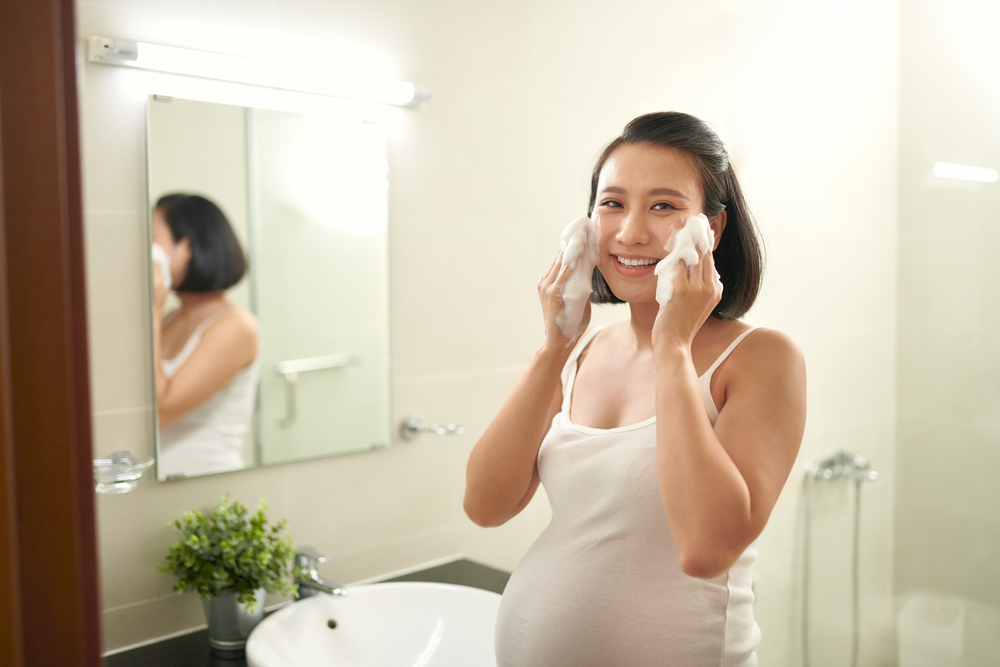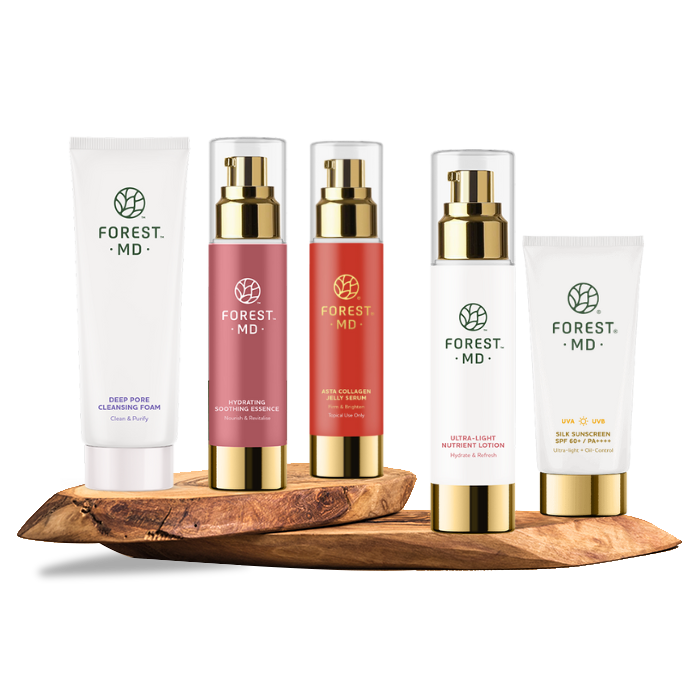The 10-month journey of pregnancy is a monumental experience that comes with its highs and lows, and often with tricky-to-navigate issues. Skincare is one of them. Changes in our skin can begin from as early as the first trimester when our hormones start readjusting. The “pregnancy glow” does not happen for every woman and usually does not last throughout the months.
Here are some essential skincare tips from our doctors:
Skin Changes During Pregnancy
Hormonal changes profoundly impact the skin. The surge of estrogen and progesterone as the baby develops in the womb leads to a variety of skin issues, including:
- Acne: Due to increased oil production.
- Pigmentation: Melasma or “pregnancy mask” may occur, resulting in dark and irregular patches on the face.
- Stretch Marks: As the skin stretches to accommodate the growing baby, stretch marks will appear, particularly on the abdomen, breasts, and thighs.
- Increased Sensitivity: Skin may become more sensitive and reactive.
- Varicose Veins and Spider Veins: These develop due to increased blood volume and circulation changes.
Ingredients to Avoid During Pregnancy
MUST Avoid:
- Retinoids (Vitamin A derivatives): Found in many anti-ageing products in the form of tretinoin, adapalene and retinol, they are linked to congenital disabilities and adverse pregnancy outcomes when taken orally.
- Hydroquinone: A skin-lightening agent that has a high systemic absorption rate.
- Phthalates and Formaldehyde: Commonly found in personal care products (both rinse-off or leave-on) like hair sprays, shampoo, nail polishes, perfumes, toners and lotions, lipsticks and even in some essential oils. They may interfere with reproductive development.
- Parabens: These can mimic estrogen, potentially disrupting hormone function and are best avoided.
- High-Dose Salicylic Acid: While low-dose topical salicylic acid is generally considered safe, high doses, especially oral forms, should be avoided.
Good to Avoid:
- Arbutin: This converts into hydroquinone in the skin, but systemic absorption is estimated to be very limited. Although it’s assumed to be safer with lower toxicity than hydroquinone and may be safely used in pregnancy, it is still good to be cautious and avoid it during pregnancy.
- Salicylic Acid: The risk during pregnancy is low if use is restricted to local areas for a limited duration. A high concentration or use under occlusion should be avoided due to the risk of salicylic toxicity.

Check Skincare Product Safety
To ensure skincare products are safe during pregnancy, it’s important to read labels carefully and consult healthcare professionals. Look for products specifically labelled explicitly as pregnancy-safe. Clean skincare should be free from harmful or harsh chemicals such as parabens, propylene glycol, petrolatum, sodium lauryl sulfate, synthetic fragrances or mineral oil.
Safe Skincare Ingredients for Pregnant Women
- Hyaluronic Acid: Excellent for hydration without any known risks.
- Niacinamide (Vitamin B3): Helps with acne, pigmentation, and redness.
- Vitamin C: Safe for brightening and improving skin tone.
- Natural Oils and Butters: Ideal for hydration and preventing stretch marks. Products from FOREST MD, formulated with these ingredients, can be a suitable choice.
- Sunscreen: Look for pregnancy-safe ingredients like benzophenone, titanium and zinc oxide.
- AHAs like Lactic or Glycolic Acid: Considered safe for use in pregnancy due to their minimal absorption. Alternatively, an enzyme exfoliator like oryza sativa, also known as rice bran, with anti-inflammatory and healing properties.
Solutions For Skin Challenges During Pregnancy
- For acne: Use gentle, non-comedogenic cleansers that won’t clog pores. Products containing niacinamide can be beneficial as they reduce inflammation and redness. Avoid retinoids, certain antibiotics, and high-dose salicylic acid. Ingredients like glycolic acid, azelaic acid, and topical benzoyl peroxide are considered safer options. Always consult a professional healthcare provider before starting acne treatment during pregnancy.
- For pigmentation: Skincare products with vitamin C can help lighten dark spots, while liquorice extract is known for its skin-brightening properties.
- For dry skin: Hydrating products containing hyaluronic acid, which helps restore moisture, and natural oils like jojoba or almond oil that nourish and reinforce the skin barrier.
- For stretch marks: While genetics play a significant role in the development of stretch marks, keeping the skin well-moisturised can help. Use creams and oils rich in natural butters and oils.
Maintaining a nutritious and balanced diet, staying hydrated and sleeping early with adequate rest are also essential, as these factors significantly contribute to both baby and mother’s overall health.

Your Pregnancy-Safe Skincare Routine
Step 1: Use a mild cleanser and do only gentle exfoliation. Safe exfoliation methods include using products with mild alpha hydroxy acids (AHA) like lactic acid or enzyme exfoliators such as oryza sativa, also known as rice bran, with anti-inflammatory and healing properties. Recommended: FOREST MD Deep Pore Cleansing Foam
Step 2: Post-cleansing, prep the skin with an alcohol-free essence or toner that contains soothing ingredients like chamomile or aloe vera. Recommended: FOREST MD Hydrating Soothing Essence
Step 3: Moisturising is super important in maintaining skin elasticity; look for products rich in natural ingredients like shea butter or hyaluronic acid. Recommended: FOREST MD Asta Collagen Jelly Serum and Ultra-light Nutrient Lotion
Step 4: Sun protection is crucial to reduce pigmentation issues; using chemical sunscreen with benzophenone or physical sunscreen with inorganic titanium and zinc oxide is safe. Recommended: FOREST MD Silk Sunscreen SPF60
Additionally, weekly treatments with just 20 minutes of a hydrating mask or an oil massage help maintain skin health and provide a much-needed relaxing me-time routine.
Pregnancy & Breastfeeding Safe Set
Our carefully curated pregnancy-safe set for that glowing mummylicious skin.
All you need to carry your skin from pregnancy and beyond.
This is an indispensable set of 5 products, full of goodness from Mother Nature, to nurture our mothers’ skin, as they navigate the challenge of changing hormones during pregnancy and breastfeeding.
While promoting the natural radiant glow synonymous with pregnancy, this medical-grade clean skincare set with silk crystal, tremella mushroom, ginseng, astaxanthin and hyaluronic acid also safely hydrates and strengthens the skin’s resilience, guarding against other pregnancy-associated conditions such as acne, sensitivity and pigmentation. Good for you, safe for baby.
Alternatively, this Pregnancy-safe and Breastfeeding-safe set makes an excellent and comforting gift. While everyone else might focus on the newborn, gift this and show your care for that deserving mummy.
Skincare Treatments and Their Pregnancy Safety
While many professional skincare treatments are safe during pregnancy, some require careful consideration.
Hydrating facials that use gentle, non-chemical ingredients and mild exfoliation can be beneficial and relaxing.
However, treatments like strong chemical peels, lasers and face injectables might pose risks and should be avoided or only undertaken after consulting a skincare professional.
It’s also advisable to inform your skin doctor or aesthetician about your pregnancy so they can tailor treatments accordingly.
Post-Pregnancy Skincare
After childbirth, the skin continues to change due to hormonal adjustments and the demands of breastfeeding. Postpartum skin care should focus on hydration and repair.
Products rich in vitamins and antioxidants can help combat the effects of sleep deprivation and stress. It’s also important to continue using gentle cleansers and moisturisers so that the skin is not stripped dry.
If you’re breastfeeding, avoid retinoids, high-dose salicylic acid, and certain antibiotics. Most topical over-the-counter skincare products are safe, but it’s always best to consult a professional healthcare provider, especially when using prescription products.
For Your Reference
Understanding that your body will change with pregnancy and identifying the skin issue is the first step to seeking appropriate skin care. Save this site as your reference for pregnancy-safe skin care tips. https://www.forest-md.com/how-to-safely-fix-common-skin-concerns-if-youre-pregnant/
When uncertain about products or treatments, consulting skin care professionals is the best course of action. Remember, every pregnancy is unique, and what works for one person may not be suitable for another.
If you’re looking for pregnancy-safe skincare, shop the range at FOREST MD. From sunscreens to cleansers and everything in between, we have the solution for your skin.
References
1. Chua, Sze Hon, et al. Asian Skin: A Reference Colour Atlas of Dermatology and Venereology. 2014.
2. Putra IB, Jusuf NK, Dewi NK. Skin Changes and Safety Profile of Topical Products During Pregnancy. J Clin Aesthet Dermatol. 2022 Feb;15(2):49-57. PMID: 35309882; PMCID: PMC8884185.










